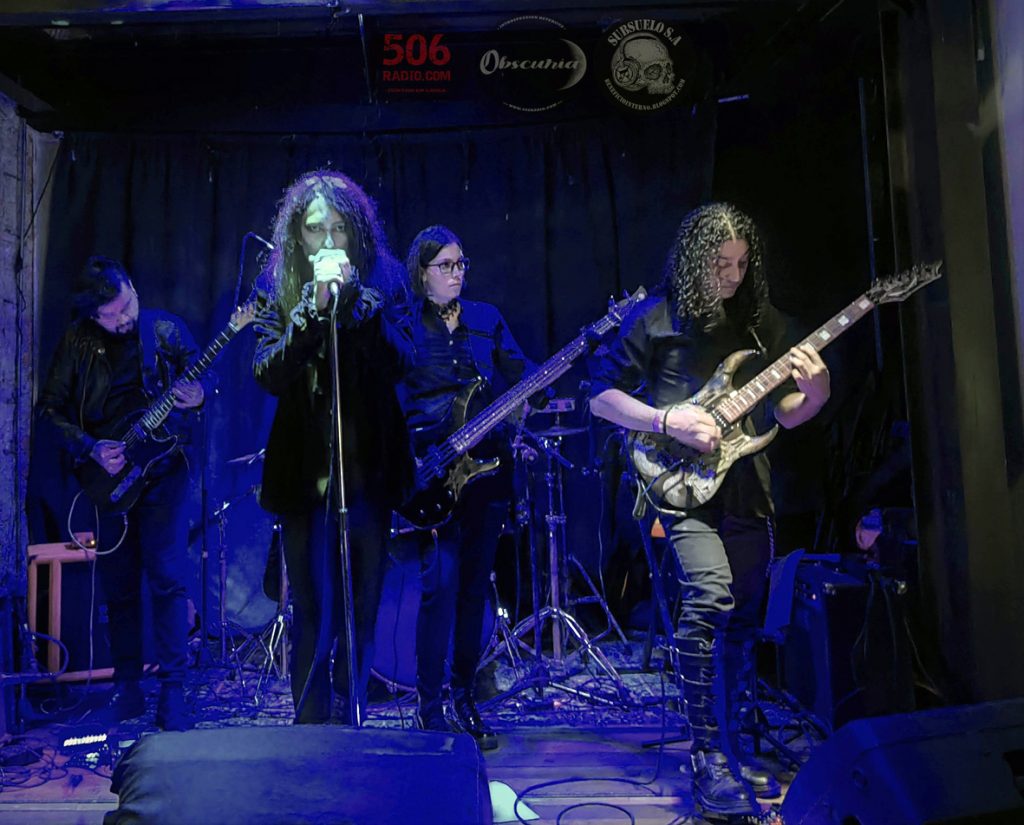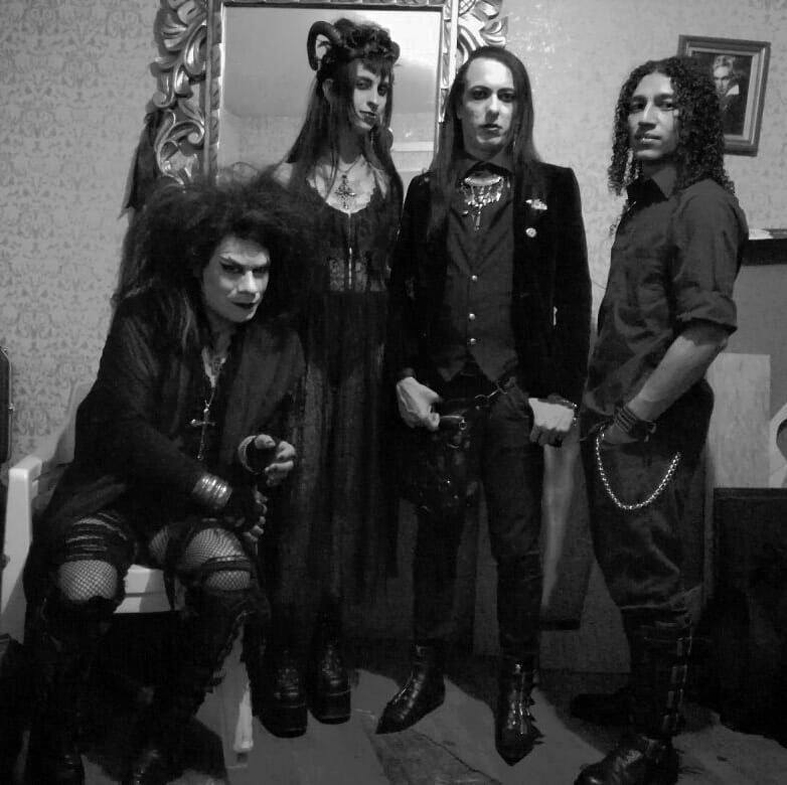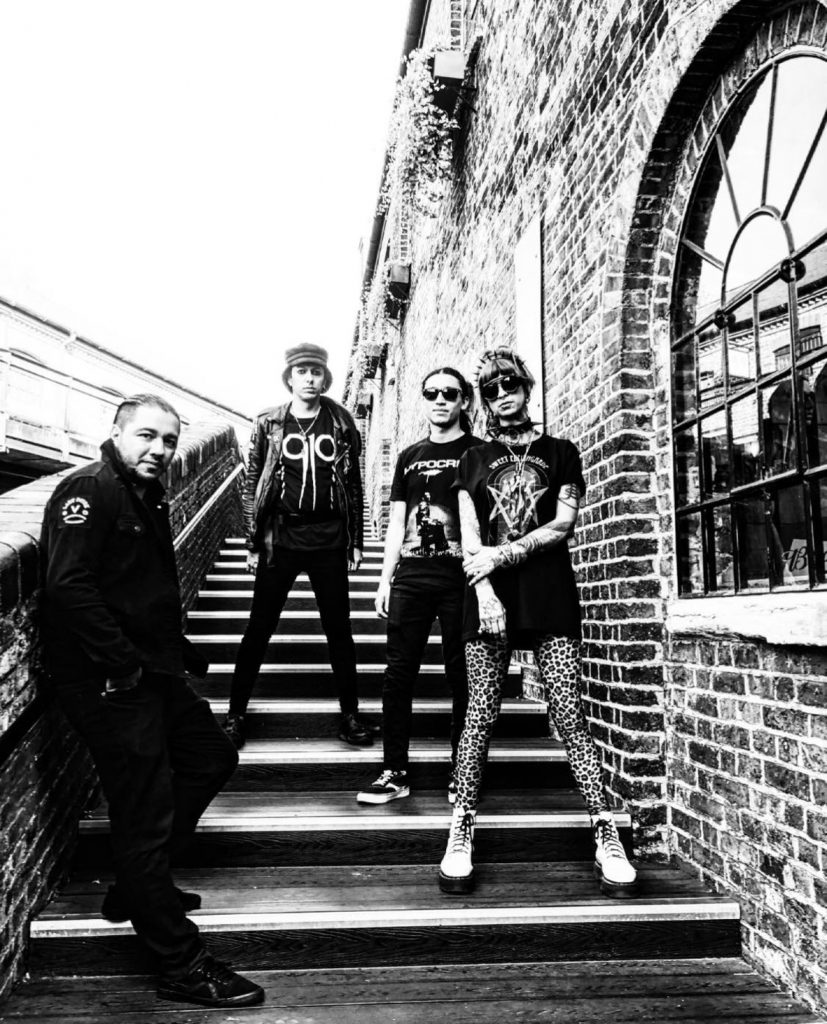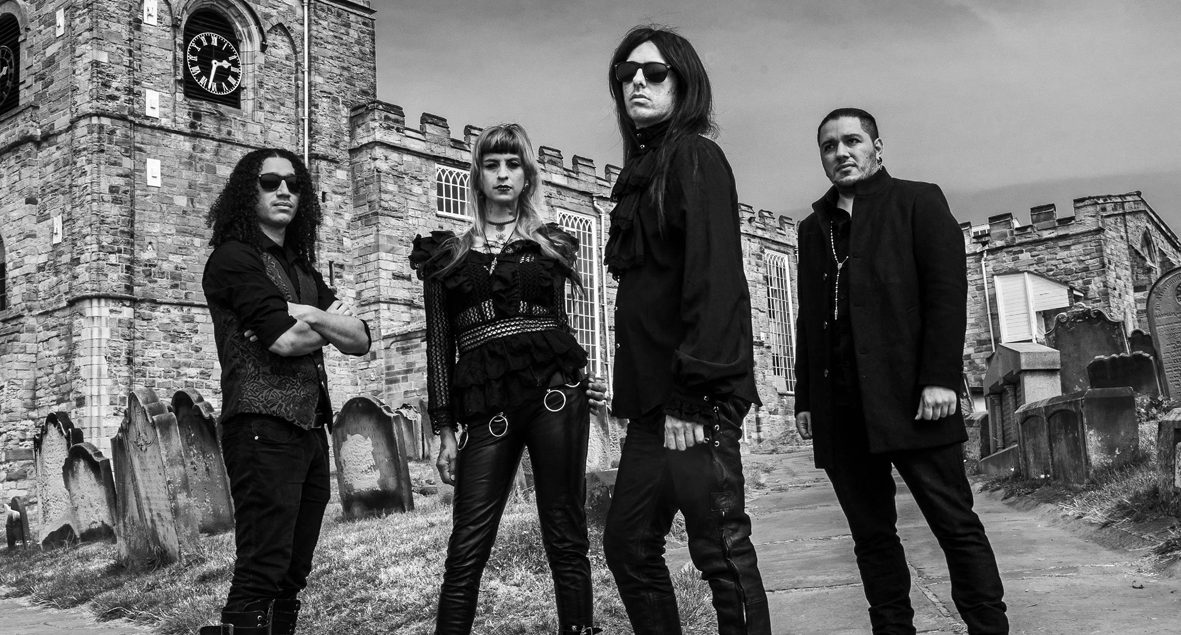Last Dusk put a shine on Costa Rica’s goth golden age
Last Dusk’s CARFAX HADDO talks to Nick Awde
Alhambra Live Magazine #012
Support independent writing, buy me a coffee at buymeacoffee.com/nickawde
Bandcamp: lastdusk.bandcamp.com | Facebook: @LastDusk
Last Dusk are Carfax Haddo (vox), Marvin (guitar), Karen Masis (bass), Gabriel Porras (keyboards), Stephanie Sabat (drums) & Roberto Thomas (guitar).
Carfax was interviewed at Alhambra Live’s goth festival Bats in the Attic 2022.
Main photo of the band in Whitby by Rob Fazz Farrell.
ALHAMBRA LIVE is one of the biggest grassroots music venues in the North West. Based in Morecambe on the sea Promenade, its adaptable spaces (and unique Lake District views) make it a vibrant hub for all-dayers and weekend festivals (Goth, Mod, Ska, Northern Soul…). It is also a home and hub for gothic music with Corrosion club night and the CorrosionFest & Bats in the Attic festivals. For more info, contact Fiona +44 (0)7771 200 873 / fiona@alhambralive.com
—Alhambra Live’s next goth festival is Bats in the Attic, September 8-9
Nick Awde: So… goth in Central America. How does that work?
Carfax Haddo: Where do I start! The emergence of goth here is something that we felt that we knew well but at the same time not at all because we didn’t have any contact with the outside goth world until a few years ago. Pretty much everything we had in music like rock was American, while at the same time the European goth scene for people here was something that was idolised and there were a lot of wrong ideas going around. Not bad ideas but just distortions of what goth is. But that’s universal of course – the same happens when Europeans look at Latin America.
It’s Central America in our case of course, and thank you for saying ‘Central America’. People here will appreciate that because most people in the rest of the world believe we are just ‘South America’, from Mexico (which is North America) to the bottom of the continent. So not seeing us as Central America, as a distinct region and culture, is the same sort of distortion in other people’s perceptions of us.
In Costa Rica itself, I’m guessing the scene started to emerge in the early 90s?
It was the 90s, and we tried our best to nurture goth culture through things like classic horror novels, movies and music. But in the beginning, the music element was quite weak because we only had access to the classics. During the 90s people only knew a few bands like Bauhaus, Siouxsie & the Banshees, Fields of the Nephilim and nothing beyond that. And then came the confusion of the label of goth being given to anything that wore black clothing and to all kinds of music genres that had nothing to do with goth. It was just the colour.
So it was quite confusing, and things really only started to change when a few people like myself started to research and research and research. I went deep into goth music worldwide, goth rock mainly, so we started to learn and understand the real meaning of what goth is through the music and how the music is created. This helped to reveal the true value of goth, where making the music is the point of it all and the aesthetics is just a result of it, an accessory, it’s not mandatory.
Nowadays, we’re living goth like a dream in Costa Rica. There aren’t many of us but we’re keeping it real and we’re meeting goths from all over the world. But it was a hard road to get here.

Tell us about how Last Dusk and the first goth bands fit into the story.
Last Dusk weren’t the first band in Costa Rica but we can claim to be the first Costa Rican goth rock band to play in the UK. [laughs] The first wave of bands are long gone now, because they just wanted to live the fashion, and it’s ironic that they ended up mocking the second and third generations of goth bands. You can say that we’re on the fifth generation now in Costa Rica.
I was in the second wave and when I came in I had all this passion mainly for the aesthetics. I was more into punk and a bit of metal but I already was feeling that there was a lot more to be discovered in goth – it’s a story in microcosm of how goth came out of punk rock, and it was the same for me. I was already involved in punk and then a friend practically dragged me into goth. They were just like, you are going to love this!
But that first wave… if I’m going to be honest, I didn’t like the people involved. They were elitist and hated the idea of newcomers, they had a hugely negative attitude, and I saw them as being the opposite of what goth should represent. In the end I found out that it was the same everywhere. [laughs] Like bands in the UK, for example, told me that it was terrible there too. They said that people were really mean and they just had to learn to live with it. But now everyone’s friendly, there’s a lot of caring wonderful people in the goth world.
But back in the 90s in Costa Rica, they were like, no you’re not one of us. And I was like, well actually I don’t want to be like you. [laughs] But I started to get used to that and to understanding the music – the Sisters of Mercy were important of course at that point.
I then joined a band in 2001. I played bass and that lasted something like eight or nine years. We became huge not only among goths and we used to go to these goth club nights here in San Jose downtown – first at Club Coliseo, later called Luna Roja, where you would get a lot of people, sometimes maybe 300. Then the organiser decided to expand because his idea of everything was to bring in more and more people and make more and more money, so the nights ended up as electro raves and that organiser faded into oblivion, people grew up and forgot about it all.
Now that’s perfectly fine. People like that, I’m with it. But it wasn’t goth any more, it became something different – and then it died. Here in Costa Rica they always said that our scene has gone up and down all the time, appeared and disappeared. So the band I was in disappeared into its pretentious rockstarism (cocky youngsters being cocky youngsters), imploding after recording one EP and two albums. I don’t even need to say the name of this band, everyone in Costa Rica knows what it is. [laughs] It’s not that I’m not proud of having been a member, but I feel that it’s something that keeps trying to drag me back and I truly find it pathetic to live from past glories that no one remembers today.
After that, everything seemed to die around 2008 and it all became more electro. It wasn’t until 2010 when I started to try to work on goth nights again, and I used all the music and contacts I’d gathered over the years to get goths back together again organising club nights under different random names.
At the same time I started Coast Rica’s first live goth podcast, the Dominion radio show which focused on Latin American goth music. It was aired in a local web radio long gone, then it transmuted to Garden of Goth and it was aired on the disappeared Deep Land Radio in Brazil, today www.gardenofgoth.com is a podcast, goth club night, gig organiser and also a goth festival. Our team of organisers includes DJ Gabriel, DJ Scarface (Mexico), Yorbier Artigas, Alexander Arley and the Last Dusk members. I don’t want to call it a revival which would be stupid, but we are putting out all the music again, actual real goth music. We also play similar genres but we always keep it pure in the musical sense.
After the goth nights I was doing died out, I decided to start Last Dusk – we’ve been going for 13 years now – and here we are.

So goth has been coming and going over the years in Costa Rica. At the moment we have a bunch of bands like MOLT, Angustia Espiritual and AM&BH, as well as Mexican bands Severance, The Funeral Medieval, and Schrödinger, Dulce Muerte and Devenir Gris from Peru, Das Projekt in Brazil, just to mention a few. You could even call this a golden age for Latin America – but I don’t believe in calling it a revival like many people are doing. I’ve had serious conversations about whether it’s a revival because of those ups and downs but in reality goth is something that has always been here. How can you say revival when people have been struggling and creating all these years, never stopping. Calling it a revival is making those people invisible.
Is there suspicion or prejudice in Costa Rica against goths and alternative music?
You find that everywhere the world. There’s also all this confusion where a goth and a metalhead are seen as the same thing. Again, that happens everywhere, it’s universal. But it’s not that I live under a rock hiding in fear. I wear whatever I like, I wear makeup in the street. I don’t care, I try to live my way. It’s definitely less nowadays, and now Costa Rican society is a bit more receptive, it’s not that aggressive. In the past things used to happen like the police would come and take you to jail for a night and cut your hair. But you saw that same hostility in the way the cops treated normal people too.
There will be some small sectors pointing their fingers at at you, especially religious extremists, it’s like a war everyday and there are many other kind of fights like that here.
That general tolerance must help if you have a growing live scene now.
That’s also happening because the goths and meal heads have supported each other since the very beginning. We have been linked to each other whether they like it or not. [laughs] There are some goths who will never agree with me on this, but that’s what happened! We owe the metal heads a lot. Not all of them have been supportive because a lot are what you might describe as repressive conservative pre-metal heads. [laughs] But yes we have collaborated a lot.
A good example is my first goth band where most of the audience were always metal heads, mainly because they had this idea of trying to get the attention of the female goths at the gigs. They had this fantasy but in the end they ended up being absorbed by the music ever since the times of MySpace and Hi5.
Importantly, in the process you’ve become a part of bringing over bands from overseas to Costa Rica?
We’ve already helped to bring over 1919 in 2018, borrowing the name of AWAKE Festival and Screaming Dead as the first Garden of Goth Festival in 2022, and in 2023 we’ll see Heartbreak Noir from the UK coming. There’s a bunch of things that other people are organising too, like the German band Pink Turns Blue will come over organised by Awake producers.
I started gathering a bunch of contacts from everywhere over the world, and they’re still in contact with us through Facebook and Instagram. They have supported us in many many ways, buying our stuff, downloading, sharing, and it’s developed into face to face contact as we play more gigs and festivals in other countries.
We also make contacts when bands come from abroad to play here. We want everyone to come here and play. You can come any anytime, this is your home. The first goth band to play here was Two Witches from Finland in 2009 organised by Awake Festival (not me) but then it took that promoter six years before something else happened here, which was when they organised DJ Revenant Murphy from Mexico.
We are working in connection with our friend DJ Lord Fer from Mexico. He’s a great guy and has done a lot for the scene, he also played the bass with us on both our visits to Mexico. He’s come here twice so far, that was Children Of The Night Party 1 & 2 consecutively in 2018 and 2019. Most recently it was the turn of another of our favorite Mexican DJs, Scarface, to appear at the Garden of Goth Festival that I was organising – the UK’s Screaming Dead headlined.
How did Last Dusk start to get gigs in Europe?
It came directly out of the international contacts that we’d built up. I silently spread the word via a very old school strategy – mailing freebies, T-shirts, stickers and CDs of the band all over the place and somehow that reached the ears of manager/agent Damian Gibbs who made it possible. An introduction led to an offer to play in the UK – Sacrosanct Festival 2015. And we were like, wait what?! At that moment we had only recorded an EP with three songs, but we said, yes let’s do it…
And then the band disbanded.
[laughs] Incredible! What happened was that I had said yes to playing in the UK without asking the rest of the band – because I’m the kind of person who thinks if life gives you something and it’s positive for you, just take it. But then the band started to disband one by one. It was like, guys we are playing in these festival – and then came fear. Someone said it was too expensive fly out and play, someone said we were going to get ripped off because we’re Latin Americans – “they hate us in Europe!” Everything was just misinformation and fear, and then they started to quit until it was just me the singer left
But then the weirdest thing happened – the band reanimated. The invitation had come in 2014 for the festival which was going to happen in 2015. Suddenly Stephanie Sabat, who’s my girlfriend, said, well I always wanted to play drums and I want to be Last Dusk’s drummer, can I do that? Yep you can. So she took an intensive course at a local academy which included Latin rhythms and all that, and in six months she was ready and joined the band.
Because I played bass in my previous band, I became the bass player and the singer at the same time. So first it was just me, then Stephanie and me, and though Last Dusk had been a four-piece before, all we realistically needed was a guitar player to become a three-piece that could play exactly the same music. We found someone, but just four months before flying out, he said, no I’m not coming with you. So we had to find and rehearse another guitarist out of the blue – and Federico Barquero stepped up.
So that was the three-piece that played the UK as Last Dusk for the first time. It may not have been the best line-up but we made it – and after that we got invited again.

Then we re-formed the band with a different guitar player and bass player, and after that we recorded our first album Memento Mori, then Roberto Thomas entered the band as our keyboard player, and then we got offered our first gig in Mexico in 2018 – and then SURPRISE!, the guitar player and the bass player quit in fear of going to Mexico, same old story, it was pure comedy. That re-shaped the band and got us back on trac. When Roberto said to me, well what do we do now, oh and I’ve been playing guitar for the last nine years – that reminded me of Stephanie first steps as a drummer and that way Roberto became our guitarist.
We decided to come again to the UK in 2017 to catch up with all of our new friends and new contacts, and we got invited to come back in 2018 to Darker Days Festival in Leicester and then again for 2019 – that year we also played at the Gryphon in Bristol with Rain Children. So it was almost like a tradition to come every year to the UK.
In 2019 we recorded our second album As The Young Die as the three-piece of Stephanie on drums, Roberto on guitars and myself on vocals and bass.
And then Covid happened just after Gabriel Porras joined as our keyboard player, and a second guitarist Marvin came at the end of 2021. So we’re obviously very happy to have had the chance to come back to the UK in 2022 and play Bats in the Attic in Morecambe. After Bats in the Attic, we went to London to join some other bands for a gig that unfortunately got cancelled at the last moment, but then we flew to Spain to play for a small crowd in a private concert in Madrid – organised by Endemoniada Promotions at Sonic Boom Studios.
So how’s 2023 shaping up?
We’ll spend 2023 focusing on making new music. We’ve already written a lot of songs that we want to record. I hope the new album will be released in the spring and we’ll do gigs to promote it. We’ll be playing in Costa Rica this year of course, but you should be seeing us live in Europe in 2024 – so far we’ll be playing the UK, Germany for the first time – organised by our dear friend Carsten Frauendorf – and Spain – thanks to Endemoniada Promotions.
On a practical level, we are already working on getting the amount of vacation necessary for being abroad in 2024 as we don’t make a living out of all this. We always try to get the most out of the UK because we’re getting to know more people there with every date we play there. I also want to try to play Portugal in 2024 and I really hope that works out – and we’ll play anywhere else of course.
There’s something wonderfully organic about the rise of Last Dusk…
Well I’m not looking for money or fame. It’s just living it. And that’s how the our little local scene has changed, turning into something that actively shares and expands the music.
Last Dusk is always changing, no doubt about that. Recently we have introduced bass player Karen Masis to take over from me, so it’s now a working family of six.
I don’t want the band to be run as a dictatorship, I believe more in things being done by the decisions that a community makes. So we are a small community – [laughs] actually, I keep telling them, you’re involved in a cult and you just don’t know it. But it’s a music cult dedicated to sharing music with people and we can all have a good time.
— Bandcamp: lastdusk.bandcamp.com | Facebook: @LastDusk
— Corrosion Facebook: @morecambegoths
— McGothicfox Promotions Facebook: @McGothicfox











